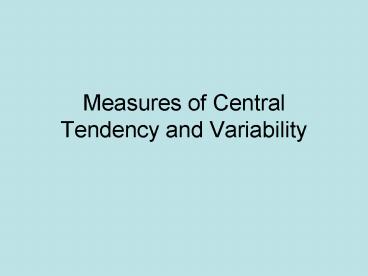Measures of Central Tendency and Variability - PowerPoint PPT Presentation
1 / 10
Title:
Measures of Central Tendency and Variability
Description:
Mid - height. Height. On your Calculator ... We would describe this as being bimodal, trimodal, etc. The calculator does not do this for you ... – PowerPoint PPT presentation
Number of Views:136
Avg rating:3.0/5.0
Title: Measures of Central Tendency and Variability
1
Measures of Central Tendency and Variability
2
Types of Data
- Numerical Data made up of observations that are
quantative and so have a numerical value
associated with them (for example height) - Categorical data made up of observations that
are qualitative (for example hair color)
As a rule of thumb, discrete data are sets of
data that can be counted (frequency), which
distinguishes it from continuous data that are
sets of data that are measured (like height or
length).
3
- Mean Numeric data is added and the result is
divided by the number of items of data. - Population Mean denoted by µ, and refers to the
mean of an entire population (think of population
like a census) - Sample Mean denoted by and refers to the
mean of a sample (think of sample as a poll) - Note both means are calculated the same way.
4
Summation Notation for Mean
For a data set x, with n items
For the height data from yesterday there are two
ways to approach the mean. total of all the
heights 5694 number of data points 36 Mean
5694 divided by 36
5
(No Transcript)
6
On your Calculator
In L1 type your midinterval values and in L2 type
the frequency.
STAT, CALC, option 1, L1, L2
7
The first one is the mean!
8
Median
- Median found by arranging all the data in order
of size and selecting the middle item. - For our height data there is an even number of
data points, so there is no middle number. Take
the mean of the two middle numbers. Which is
156.5
Arrow down on the 1-Var Stats screen and MED will
be the median
9
Mode
- Mode The most frequent data point, or in
grouped data the most frequent class of data. In
the height data the 151 153 class has the most
students it in, so it would be the mode. - Note It is possible for a data set to have more
that one mode. We would describe this as being
bimodal, trimodal, etc. - The calculator does not do this for you
10
(No Transcript)































